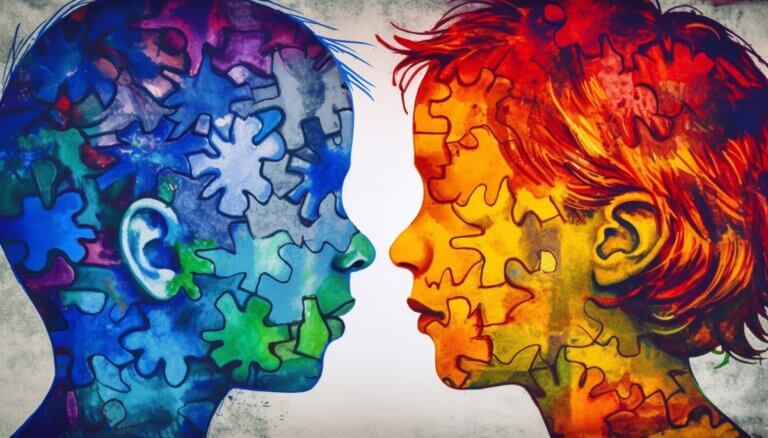Table of Contents
Fundamentals of Emotional Intelligence in Human Resource Development

Self-awareness as the Foundation of Personality Development
To thrive in the modern work environment, not just survive, it is essential to cultivate skills in emotional intelligence from the field of personal development. Integrating emotional intelligence into employee development plays a central role here. Self-awareness serves as the key component, which involves the conscious recognition and understanding of one’s own emotional world, forming the solid foundation of personality development.
Recognizing One’s Own Emotions
The ability to recognize one’s own emotions means more than just knowing when one is angry or happy. It involves a deep introspection that, for instance, reveals why certain situations cause stress or what exactly lies behind a feeling of satisfaction. Practical examples show what this ability looks like in practice: Suppose a project manager feels overwhelmed by upcoming deadlines. By identifying his fear as a reaction to the anticipated performance pressure, he can take proactive steps such as applying time management techniques or asking for help.
Development of Skills as a Continuous Process Another essential aspect is understanding that the development of skills in emotional intelligence is an ongoing process. This is particularly significant in the context of talent development and human resource strategies, where individual further education holds great importance. Regular feedback and the willingness for self-reflection enable individuals to further develop their emotional competencies and thus act more effectively in the professional environment.
Impacts on Personnel Development
Implementing emotional intelligence into personnel development not only leads to increased self-awareness among employees but also has economically relevant benefits. Greater resilience to stress-induced work conditions, improved communication skills, and a more empathetic tone contribute to general job satisfaction and a positive working atmosphere.
Research has found that employees who practice intensive self-awareness and continually work on their emotional intelligence are more productive and exhibit a stronger commitment to the company. Thus, it becomes clear that investing in personnel development in emotional intelligence represents a long-term and sustainable strategy that benefits both the individual and the entire company.
The Role of Self-Regulation in the Workplace
Self-regulation is a key skill when it comes to Personal Development Emotional Intelligence. Employees who can manage their emotions are not only more productive but also contribute to a more positive work environment. This phenomenon can be deeply understood and illustrated with the help of scientific studies and real business scenarios.
The first step in self-regulation is recognizing one’s own emotions. A manager who feels anger or frustration might act impulsively, leading to counterproductive decisions or conflicts within the team. By self-observing and pausing during heated moments, this manager can instead choose a thoughtful response that yields better long-term results.
Methods to Promote Self-Regulation
One of the most effective methods is the training of mindfulness techniques. Through regular practice, employees can learn to interrupt their automatic thought patterns and control impulsive behavior. This leads to more composure and better skill development.
- Furthermore, techniques of emotion management foster a deeper understanding of the triggers for strong emotions and how they can be effectively handled.
- Another approach is the setting of clear goals. By setting conscious goals for their emotional development, employees can better track and reflect on their progress.
- It is also important to strengthen feedback cultures, which enable honest but constructive feedback and thus encourage self-reflection.
A study by Gross (2002), a professor at Stanford University, shows that self-regulation leads to higher satisfaction and a lower burnout rate. This highlights the importance of Emotional Intelligence in Employee Development.
Implementation in HR Strategies
A successful company integrates measures to promote emotional intelligence into its HR strategies. Training sessions, workshops, and coaching are common elements used by companies to enhance their employees’ self-regulation. Moreover, measures to promote resilience, the capacity to deal with stress and setbacks, are more important than ever in challenging times.
It remains clear that self-regulation is an indispensable component for Talent Development and constructive cooperation in the workplace. Companies that invest in this essential skill benefit from a more stable, innovative, and efficient team. Here, it’s not just about short-term control of emotions but about creating a lasting culture where emotional intelligence serves as the foundation for professional success.
Emotional Intelligence in Talent Development

Emotional Intelligence in Talent Development
Empathy is the heart of emotional intelligence and a critical factor in developing effective leadership qualities. At the core of emotional intelligence in personal development, it is crucial to enhance the ability to put oneself in the position of others, thereby improving teamwork and performance in the company. This empathy is a key component that is crucial in employee support and talent development.
Empathy in Everyday Leadership
In practice, empathy for a leader means regularly practicing active listening and paying attention to the nonverbal signals of employees. Direct eye contact, an open body posture, and paraphrasing what has been said can already be a signal that the concerns of the counterpart are being taken seriously. Emotional intelligence in employee support also involves leaders leading by example. Their own emotional clarity and balance promote a culture of openness and trust.
- Communication: True empathy is expressed not only in what is said but also in how it is said. With a sensitive approach and genuine interest, a leader builds a strong foundation for motivated teams.
- Conflict Resolution: Empathetic leaders recognize conflicts early and intervene constructively. They understand the perspectives of all parties involved and work on solutions that contribute to the well-being of the entire team.
- Feedback: To promote the personal and professional development of their employees, an empathetic leader gives individually tailored, constructive feedback that focuses on the individual and emphasizes their strengths.
Developing Empathy
How can empathy specifically be fostered in training and development programs? One of the most effective methods is role-playing, where leaders take on the perspective of employees to look at challenges from a different angle. Regular reflection rounds, where emotions and experiences are openly shared, are also beneficial for empathetic understanding.
Incorporating meditation and mindfulness training into corporate personnel strategies has also proved useful in enhancing self-awareness and empathy. Furthermore, the continuous development of skills like empathy strengthens the entire company structure, as empathetic leaders serve as role models and create a culture of humanity and readiness to perform.
The integrative power of empathy ultimately shapes the social competence of leaders and provides them with the tools to generate respect, strengthen relationships, and ultimately create an atmosphere in which innovation and commitment can thrive.
Social skills in dealing with colleagues and customers
Emotional intelligence is the invisible mechanism that keeps the machinery of professional success running smoothly. In personnel development, social skills play a central role. These abilities are crucial when it comes to effectively interacting with colleagues and clients.
Effective Communication as a Foundation
Every interaction begins with communication, which is more than just the exchange of information. Emotional intelligence requires a deep understanding of the feelings and needs that accompany our words. Talent development in this area means teaching employees not only what to say, but most importantly, how to say it. A simple smile or a gesture of recognition can work wonders and lay the foundation for sustainable relationships.
- In employee development, there is a specific focus on the ability to read emotions in voice, facial expressions, and body language and to respond accordingly.
- Constructive feedback and active listening are part of the standard repertoire of well-developed emotional intelligence.
- In customer contact, these competencies not only help avoid conflicts but also cater to individual needs.
Conflict Management with a Delicate Touch
Conflicts at the workplace are inevitable. Developing emotional intelligence in employee promotion means not only managing conflicts but also using them as an opportunity to improve collaboration. Employees are trained to recognize tensions early and to bring about conflict resolutions through empathetic communication.
This requires HR strategies that create an atmosphere of trust and openness. Emotional intelligence enables employees to look beyond the horizon and understand the perspectives of their colleagues. This not only promotes team cohesion but also strengthens the individual development of skills.
Relationship Building – The Core of Social Skills
Long-term relationships are the hallmark of any company. Here, one thing matters above all: authenticity. Individuals with high emotional intelligence can show genuine interest and create connections that go beyond purely business transactions. This is particularly invaluable in sales and customer service.
At its core, it is about more than just adaptability; it is about the ability to connect with others and generate resonance. Forward-looking HR strategies therefore focus on:
- Training that strengthens empathy and sharpens the awareness of the individual stories and needs of our counterparts.
- Practicing patience and genuine interest in customer contact to secure a lasting and positive customer experience.
- Promoting networking skills that enable a broad spectrum of useful relationships beyond one’s own area.
In essence, emotional intelligence is the crucial link that allows for successful navigation in the complex world of interpersonal relations – a decisive advantage in the world of personnel development and talent promotion.
Summary
Emotional intelligence in personnel development is the pivotal point for success in the modern workplace. Self-awareness forms the foundation and enables us to recognize and understand our own emotions – a critical step to act proactively and promote personal growth. The continuous development of skills is an indispensable process in talent enhancement, with HR strategies focusing on improving self-regulation and empathy.
Promoting emotional intelligence in employee development not only strengthens individual resilience and communication but also leads to deeper employee engagement and increased productivity. HR strategies should therefore aim for a culture of continuous improvement that specifically strengthens emotional competencies. Key aspects include mindfulness training, emotion management, and setting goals for emotional development.
Effective Methods to Enhance Emotional Intelligence
Various approaches are essential for the successful integration of emotional intelligence into HR strategies:
- Mindfulness training helps employees control impulsive reactions and promotes serenity.
- Emotion management techniques equip individuals with the tools to recognize emotional triggers and respond appropriately.
- Feedback cultures that enable open and honest feedback contribute to improved self-awareness.
Ongoing training and workshops that deepen skills in emotional intelligence and contribute to resilience development are also critical. Empathy, as the core of emotional intelligence, is particularly important for leaders to pay attention to the non-verbal signals of their employees and thus establish a trust relationship.
Empathetic behavior of leaders, shown through active listening and the manner of communication, is essential for talent development. Integrating empathy promotes a positive workplace environment and is a key factor for team performance. Conflict management and effective communication are thus at the top of the list of skills that should be expanded in employee development to enable long-term, authentic relationships.
- Emotional intelligence supports building genuine connections that go beyond transactional interactions.
- Employees learn to recognize emotions in voice, facial expressions, and body language and respond to them.
- In conflict management, emotional intelligence helps perceive tensions early and address them constructively.
In short, emotional intelligence in personnel development is the invisible gear that drives work efficiency and the interpersonal climate, creates the basis for innovation and engagement, and thus provides a critical advantage in the world of talent development.
FAQ – Emotional Intelligence in Human Resource Development
How can emotional intelligence be integrated into existing strategies for personnel development and talent promotion to strengthen leaders and employees in their social competence?
Emotional intelligence can be integrated into personnel development by offering training sessions specifically aimed at enhancing EQ, which promote empathy, self-reflection, and effective communication. Through coaching programs and interactive workshops, leaders and employees learn to recognize and appropriately respond to emotions in themselves and others, leading to improved team dynamics and higher employee satisfaction. This is manifested in practice through regular feedback, conflict resolution skills, and the ability to create a motivating work environment.
How can emotional intelligence be concretely incorporated into the planning of employee development and talent promotion programs?
Emotional intelligence can be integrated into personnel development by offering training targeted at improving self-awareness, self-regulation, motivation, empathy, and social skills. This not only promotes the personal development of each employee but also strengthens team dynamics and communication, which in turn can lead to a more effective and innovative work environment. An example of this is a workshop that uses role-playing to enhance conflict resolution skills, helping employees learn how to better manage their own emotions and those of their colleagues in challenging situations.
How can emotional intelligence be effectively integrated into strategies for staff development and talent promotion to improve the work atmosphere and team productivity?
Emotional intelligence can be enhanced in personnel development and talent promotion by offering trainings and workshops where employees learn to better understand their own emotions and those of their colleagues, as well as to respond to them appropriately. Empathetic understanding and constructive communication are particularly promoted through role-playing and feedback sessions, leading to a positive work atmosphere and increased team productivity.




